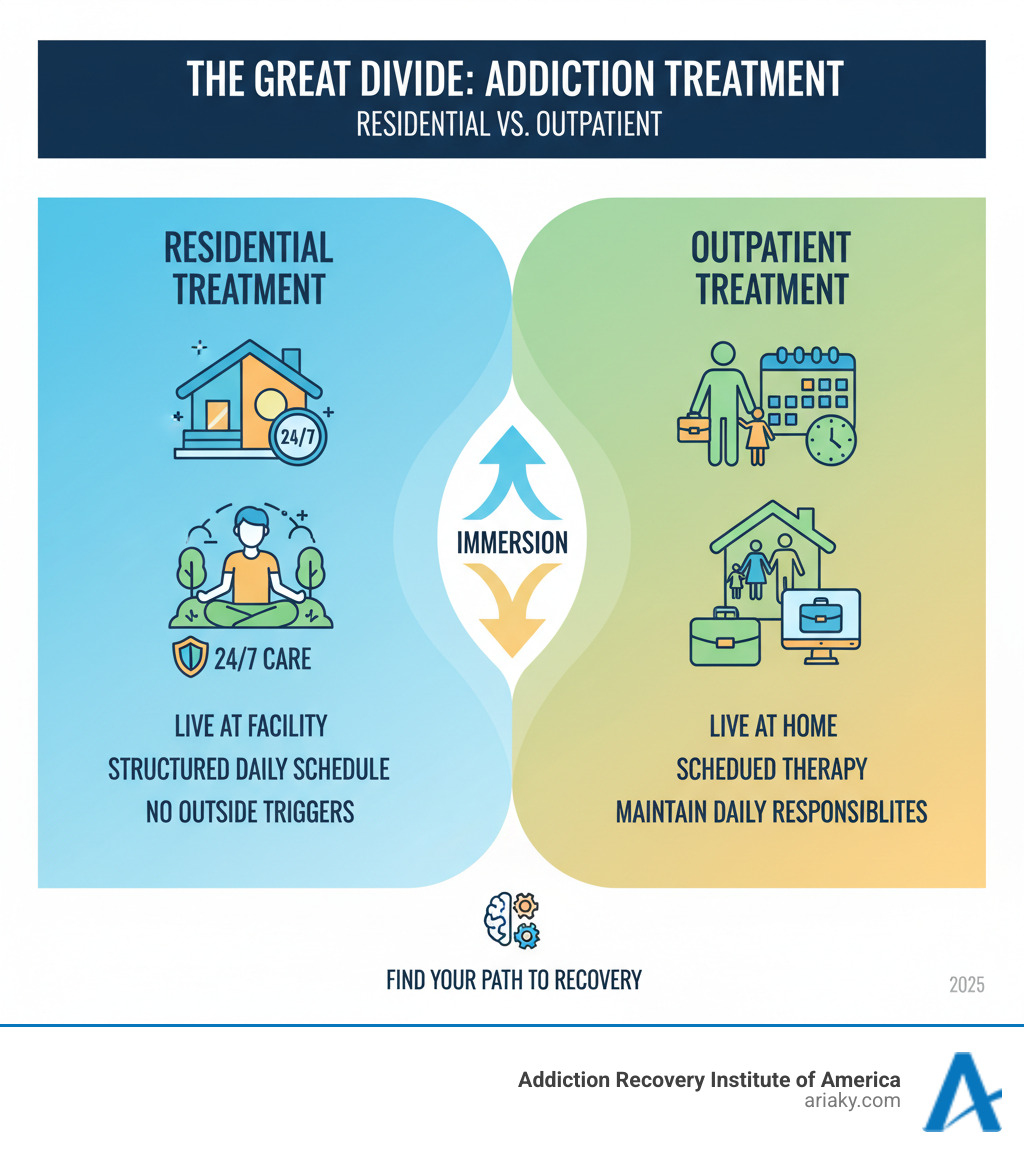Understanding Your Treatment Options: Why It Matters
How residential treatment drug addiction differs from outpatient comes down to where you live during recovery and how intensive your care is. Residential treatment means living at a facility 24/7 with around-the-clock support, while outpatient treatment lets you live at home and attend scheduled therapy sessions.
Quick Comparison:
| Aspect | Residential Treatment | Outpatient Treatment |
|---|---|---|
| Living Arrangement | Live at the treatment facility | Live at home |
| Supervision | 24/7 medical and emotional support | Scheduled appointments only |
| Intensity | Full immersion in recovery | Part-time treatment |
| Duration | Typically 30-90 days | 3 months to over a year |
| Best For | Severe addiction, unstable home environment | Mild to moderate addiction, strong support system |
| Flexibility | Limited contact with outside world | Continue work, school, family responsibilities |
A recent study found that about 1 in 10 Americans will struggle with drug addiction at some point in their lives. Yet only a small fraction of those affected ever receive treatment. If you’re reading this, you’re already taking an important step toward understanding your options.
Choosing between residential and outpatient care isn’t about picking the “better” option—it’s about finding the right fit for your unique situation. Your decision depends on factors like the severity of your addiction, your home environment, whether you have co-occurring mental health conditions, and your daily responsibilities.
This guide breaks down exactly how these two paths differ, who benefits most from each approach, and what to expect from both types of care. By the end, you’ll have the information you need to make an informed decision about your recovery journey.

At a Glance: Key Differences Between Residential and Outpatient Care
If you’ve been looking into treatment options, you’ve probably noticed that “inpatient” and “residential” mean essentially the same thing—you live at the facility during treatment. Outpatient care is the opposite: you live at home and come in for scheduled sessions. Understanding how residential treatment drug addiction differs from outpatient starts with these basic living arrangements, but there’s much more to the story.
The biggest difference isn’t just where you sleep at night. It’s about structure, support level, and how your daily schedule looks during recovery. Residential treatment wraps you in a 24/7 environment designed specifically for healing. You step away from your regular life—the stress, the triggers, the familiar patterns that might have contributed to your addiction. Your brain gets a chance to reset without the constant pull of old habits.
In a residential program, your days follow a structured routine filled with group therapy, individual counseling, skill-building activities, and time for reflection. Medical staff are on-site around the clock, ready to help if you need them. There’s something powerful about being surrounded by others who truly understand what you’re going through, all working toward the same goal.
Outpatient treatment takes a different approach. You continue living at home, going to work or school, and maintaining your family responsibilities. Instead of full immersion, you attend therapy sessions several times a week—maybe a few hours at a time, or more intensive programs that meet daily. You’re applying what you learn in treatment to your real life immediately, which can be both challenging and incredibly valuable.
The duration and intensity vary significantly too. Residential programs typically last 30 to 90 days, though some people benefit from longer stays. Outpatient care often extends from three months to over a year, with different levels of intensity. Intensive Outpatient Programs might have you attending nine or more hours per week, while standard outpatient care requires fewer hours.
Neither path is automatically better than the other. What matters is finding the right match for your situation. Someone dealing with severe addiction and an unstable home environment will have very different needs than someone with mild to moderate substance use and a strong support system at home. For a comprehensive look at these differences, check out our guide on Inpatient vs Outpatient.

How Residential Treatment Drug Addiction Differs from Outpatient in Detail
The core of how residential treatment drug addiction differs from outpatient lies in two distinct philosophies. Residential treatment offers a sanctuary where recovery is the sole focus, pausing regular life to heal. Outpatient treatment integrates recovery into your daily world, teaching you to build sobriety amidst your work, family, and community.
Both paths use therapy and medical support, but the delivery differs. Residential care provides an immersive environment, free from daily triggers, allowing the brain and body to heal without interference. Outpatient care offers flexibility and real-world application, letting you practice new skills in your actual life. Neither is inherently better; they suit different needs. Understanding these differences is key to choosing the right path. For a comprehensive look at your options, check out our Substance Abuse Treatment Complete Guide.
Setting, Structure, and Daily Life
In a residential treatment facility, you live full-time in a highly structured world. Your day follows a schedule of therapy, counseling, and educational workshops designed to support healing. The key benefit is the removal from outside stressors and triggers—no work demands, family conflicts, or access to substances. This drug-free space, shared with peers on the same journey, provides the breathing room to understand addiction and develop new, healthy routines.
Outpatient treatment is different: you live at home and manage your daily responsibilities while attending scheduled appointments. Treatment might involve a few evening sessions per week or more intensive daily programs. The primary advantage is practicing recovery in your real-world environment from day one. You apply coping skills immediately when facing triggers at work or home. This approach works best with a stable home environment and a supportive personal network.
Level of Medical and Emotional Support
Residential treatment provides 24/7 medical monitoring and clinical support. This is crucial during detox or for managing co-occurring mental health crises, as help is available at any hour. Beyond physical safety, this constant supervision offers emotional security. You’re surrounded by on-site clinical staff and peers who understand your struggle, creating a powerful peer support network that combats isolation. This level of care is often vital for those with severe addiction or trauma.
Outpatient programs structure support around scheduled therapy sessions. While you’re on your own between appointments, quality programs offer phone support and connect you to community resources. Your support system includes your therapist, therapy group, and your personal network of family and friends. Research shows that for some conditions, like opioid use disorder, outpatient care with proper medical support can be highly effective. However, situations requiring intensive psychiatric care often see better outcomes with residential treatment, as noted in this Summary of Evidence – Inpatient and Outpatient Treatment.
Treatment Duration and Intensity
Residential programs are intense, short-term immersions, typically lasting 30 to 90 days. During this time, recovery is your sole focus, allowing for deep work on the underlying causes of addiction. This full immersion helps rewire thought patterns and behaviors in a concentrated period.
Outpatient treatment generally lasts longer—from three months to over a year—but with less daily intensity. It often occurs in phases:
- Partial Hospitalization Programs (PHP) are the most intensive, with treatment for several hours a day, five to six days a week. You get a high level of structure but return home at night.
- Intensive Outpatient Programs (IOP) are a step down, usually involving nine to twelve hours per week of therapy. IOPs, often lasting about 90 days, focus on building practical skills for managing life’s responsibilities while staying sober. Learn more in this guide to Substance Abuse Intensive Outpatient Programs.
- Standard outpatient programs involve fewer than nine hours per week and are ideal for milder issues or as long-term support.
This flexible continuum allows treatment to adapt to your progress.
Family Involvement and Contact
In residential treatment, contact with the outside world, including family, is often limited initially. This separation provides space to focus on yourself without the emotional complexities of family dynamics. However, most programs integrate scheduled family therapy sessions. These sessions educate loved ones about addiction, teach them supportive behaviors, and begin the process of repairing relationships, preparing them for your return.
With outpatient treatment, family is involved from day one. You’re living at home, so they witness your recovery in real-time. Family counseling is a key component, helping to create a supportive home environment, establish healthy boundaries, and improve communication. A strong support system at home is crucial for outpatient success. For more on navigating recovery’s problems, visit our page on Addiction Recovery Challenges.
Choosing Your Path: Who Is the Ideal Candidate?
Choosing between residential and outpatient treatment is a personal decision based on your unique circumstances. The severity of your addiction, your mental health, home environment, and support system are all critical factors. How residential treatment drug addiction differs from outpatient is most apparent when considering who is best suited for each setting. Your motivation, past recovery attempts, and daily responsibilities also guide the choice. The right match between your needs and the program is a key predictor of success. For an overview of local options, our Drug Rehab Kentucky Guide is a helpful resource.
When to Choose a Residential Treatment Program KY
Residential treatment provides a complete break from your current environment, offering a safe space where recovery is the only priority. This option is often best for individuals with:
- Severe substance use disorder, especially after multiple unsuccessful attempts to quit.
- An unstable or triggering home environment that undermines sobriety.
- A high risk of relapse due to intense cravings or a lack of personal support.
- Co-occurring mental health conditions like depression, anxiety, or PTSD that require integrated, intensive care.
- A need for medical detox, as withdrawal from substances like alcohol or opioids can be dangerous without 24/7 supervision.
The structure and constant encouragement of residential care can provide the breakthrough needed for those who have struggled with other forms of treatment.
When an Outpatient Treatment Program KY Is the Right Fit
Outpatient treatment allows you to integrate recovery into your life with professional guidance. It is often the right fit if you have:
- A mild to moderate substance use disorder.
- A strong support system of family and friends.
- A stable and safe living situation free from major triggers.
- Work or family obligations that make residential treatment impractical. Outpatient programs offer flexible scheduling to accommodate your life.
Outpatient care is also an effective step-down from residential treatment, providing a supportive bridge back to daily life through programs like PHP or IOP. It allows for real-world application of coping skills, building confidence as you steer challenges in real time. If you have a solid foundation and are motivated to heal within your community, outpatient care can be an excellent choice.
The Role of Key Treatment Components
Regardless of the path, effective addiction treatment relies on key pillars: detoxification, addressing mental health, aftercare planning, and relapse prevention. Understanding how residential treatment drug addiction differs from outpatient involves seeing how these components are delivered in each setting. While the core elements are the same, their intensity and structure vary. Our Kentucky Addiction Treatment Guide explores these foundations in more detail.

How does detox play a role in how residential treatment drug addiction differs from outpatient?
Detoxification, the process of safely clearing substances from the body, is where the difference between settings is stark.
- A residential setting provides 24/7 medical supervision. This is essential for managing withdrawal from substances like alcohol or benzodiazepines, where symptoms can be life-threatening. The constant medical presence ensures safety and comfort during this difficult initial phase.
- Outpatient detox is suitable for mild to moderate withdrawal. You visit a clinic for regular check-ins and medication management but return home to sleep. This approach can be safe and effective with professional oversight.
The right choice depends on the substance used, your health, and your home environment. For more on inpatient approaches, review this In-Patient Treatment for Substance Use resource.
How co-occurring mental health conditions influence the choice
Addiction often co-occurs with mental health challenges like depression or anxiety, a condition known as a “dual diagnosis.”
- For severe or unstable mental health symptoms, residential care offers the necessary comprehensive support. An integrated team of psychiatrists and therapists can treat both conditions simultaneously in a controlled environment.
- For stable or milder mental health conditions, outpatient treatment can be very effective. You learn to manage both your addiction and mental health in your daily life with professional guidance.
As noted by the Substance Abuse and Mental Health Services Administration (US), individuals with more complex mental health needs often have better outcomes in inpatient care, where support matches the intensity of their needs.
Aftercare and the Continuum of Care
Recovery is a long-term journey that continues after primary treatment ends. Aftercare and the continuum of care provide the ongoing support needed to maintain sobriety. This can include:
- Transitioning to a lower level of care, such as moving from residential treatment to an outpatient program (IOP or PHP).
- Sober living homes, which offer a drug-free, accountable living environment.
- Alumni programs, like those offered at ARIA, to connect with peers in recovery.
- Community support groups, such as 12-step programs (AA/NA) or alternatives like SMART Recovery, which provide invaluable peer support.
- Continued therapy to reinforce coping skills and steer life’s challenges.
A strong aftercare plan includes relapse prevention strategies, helping you identify triggers and develop healthy responses. Staying engaged in aftercare for three months or longer significantly improves the chances of lasting recovery.
Conclusion: Making the Right Choice for Lasting Recovery
Here’s the truth: there is no single best approach to addiction treatment. What works beautifully for one person might not be the right fit for another. The journey to recovery is as unique as you are, and that’s why understanding how residential treatment drug addiction differs from outpatient matters so much.
Think of it this way: residential programs offer a complete sanctuary, a place where you can step away from everything and focus entirely on healing. It’s 24/7 support, structure, and safety—ideal when you’re facing severe addiction, an unstable home environment, or complex mental health challenges alongside your substance use. Outpatient programs, on the other hand, let you stay connected to your daily life while building recovery skills. You attend scheduled sessions, maintain your job or family responsibilities, and learn to apply what you’re learning in real-time. This flexibility works well for milder cases, when you have a strong support system at home, or when you’re transitioning down from more intensive care.
The real key to lasting recovery is personalized care. Your specific situation—how severe your addiction is, what your mental health looks like, whether your home is a safe place, what responsibilities you’re juggling—these all matter. A lot. That’s why we always recommend getting a professional assessment. Be honest with yourself about what you truly need. Sometimes we think we can “tough it out” with less support, but there’s no prize for making recovery harder than it needs to be.
At Addiction Recovery Institute of America (ARIA) in Kentucky, we get it. Taking the first step feels overwhelming. Maybe you’re scared, or you don’t know where to start, or you’re worried about letting people down. Here’s what we want you to know: reaching out for help is one of the bravest things you’ll ever do. It’s not weakness—it’s wisdom.
We offer a full range of treatment options, from medically supervised detox to residential programs, PHP, and IOP. Every program is custom to your individual needs because cookie-cutter treatment just doesn’t work. Our team is here to walk alongside you, figure out what makes sense for your unique situation, and build a plan that gives you the best chance at lasting sobriety.
You don’t have to have all the answers right now. You don’t even have to be completely sure you’re ready. You just have to be willing to take one step. Call us. Ask questions. Let’s talk about what you’re facing and explore which program might be the right fit for you or someone you love.
Recovery is possible. You deserve it. And we’re here to help you find your path.
Find the right Kentucky Drug & Alcohol Rehab Program for you


